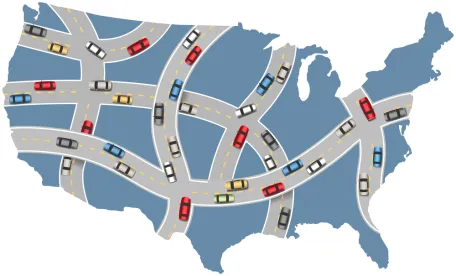In an order with significant implications for motor carriers, the Federal Motor Carrier Safety Administration (FMCSA) concluded that California’s meal and rest break rules are preempted by federal transportation law and may no longer be enforced by the State of California where the driver is subject to federal hours-of-service (HOS) requirements. Specifically, on December 21, 2018, the FMCSA found that “California may no longer enforce the [meal and rest break rules] with respect to drivers of property-carrying [commercial motor vehicles] subject to FMCSA’s HOS rules.” On December 28, 2018, the order was posted in the Federal Register.
Background
The order addresses the interplay between the HOS requirements promulgated by the federal FMCSA and the meal and rest break (MRB) rules promulgated by California’s legislature and state agencies.
The federal HOS regulations established by the FMCSA are found at 49 C.F.R. Sections 395.1–395.13 and set forth various requirements for property-carrying drivers, including that a driver may drive a maximum of 11 hours after 10 consecutive hours off duty and may drive only if eight hours or less have passed since the driver’s last off-duty or sleeper berth period of at least 30 minutes.
California’s MRB rules, which are significantly more onerous, are found at Sections 512 and 516 of the California Labor Code, as well as in industry-specific wage orders, including Sections 11 and 12 of Wage Order 9-2001, which applies to the transportation industry. Among other things, the MRB rules require an employer to provide an off-duty, 30-minute meal period before the end of the fifth hour of work, as well as a 10-minute rest break for every four hours worked or major fraction thereof, along with additional meals and breaks on shifts lasting longer than 10 hours, though an employee can waive meal periods and rest breaks under certain circumstances.
In mid-2018, two trucking industry associations petitioned the FMCSA to address the different obligations imposed by federal and state laws. In response, the petition received over 700 public comments.
Legal Authority for FMCSA Preemption Ruling
The petitions were made pursuant to 49 U.S.C. § 31141, which expressly provides that a “State may not enforce a State law or regulation on commercial motor vehicle safety that the Secretary of Transportation decides under this section may not be enforced.” In reviewing state laws and regulations on motor vehicle safety, the Secretary of Transportation must answer the following questions:
- Question 1: Does the state law or regulation have the same effect as a regulation prescribed by the Secretary, is less stringent than such regulation, or is “additional to or more stringent” than such regulation?
- If the state law or regulation is additional to or more stringent than a regulation prescribed by the Secretary, the analysis turns to Question 2.
- Question 2: Does the state law or regulation (a) have no safety benefit, or (b) is it incompatible with the regulation prescribed by the Secretary, or (c) would it cause an unreasonable burden on interstate commerce?
- If the answer to Question 2 is “yes,” even as to only one factor, the state law or regulation is preempted.
The Secretary’s authority in making these determinations was delegated to the FMCSA Administrator by 49 C.F.R. § 1.87(f).
FMCSA’s First Finding: California’s MRB Rules Are More Burdensome Than Federal HOS Regulations
Answering Question 1, the FMCSA found that California’s MRB rules are “additional to or more stringent than” the federal HOS regulations. The Administrator observed the following:
The MRB Rules require employers to provide [commercial motor vehicle] drivers with more rest breaks than the Federal HOS regulations, and they allow a smaller window of driving time before a break is required. For these reasons, the MRB Rules do not have the same effect and are not less stringent than the Federal HOS regulations, and instead are additional to or more stringent than the HOS regulations.
FMCSA’s Second Finding: MRB Rules Conflict With Federal HOS Regulations
Answering Question 2, the FMCSA found that California MRB’s are preempted because they have no “safety benefit,” are incompatible with the HOS regulations, and “cause an unreasonable burden on interstate commerce.” Thus, the FMCSA found that there were multiple grounds for preemption.
California’s MRB Rules Have No Safety Benefit
The FMCSA found that California’s MRB rules have no safety benefit and may actually detract from driver safety.
With respect to the issue of driver fatigue, the FMCSA noted that it had intentionally modified the HOS rules in 2011 when it added the requirement that a driver take a 30-minute break in any eight-hour driving window.
Here, the MRB Rules abrogate the flexibilities the Agency purposefully built into the Federal HOS Rules regarding when a driver is required to take a 30-minute rest period, and they graft onto the Federal HOS regulations a requirement for additional 10-minute rest breaks. While the [California] Labor Commissioner cites studies, statistics, and recommendations from the NTSB, academia, and the FMCSA tending to show that drowsy driving causes crashes, the Agency has reached the same conclusion, hence the off-duty break requirement in the HOS regulations and the explicit prohibition against fatigued driving. Therefore, FMCSA determines that the MRB Rules do not provide a safety benefit not already realized under the [HOS regulations].
With respect to the issue of parking, the FMCSA noted that the additional and more regimented breaks required by the MRB rules do not eliminate, and actually contribute to, dangerous conditions on the highways. After summarizing studies and the other evidence in the record, the FMCSA concluded that “there is a shortage of safe parking for [commercial motor vehicle drivers], and the Agency believes that requiring [those] drivers to make triple the number of stops during a 10-hour shift under the MRB Rules compared to the Federal HOS rules, when there is a demonstrated inability for some drivers to safely park, has negative safety implications.”
California’s MRB Rules Are Incompatible With Federal HOS Regulations
The FMCSA also found that the increased requirements imposed by MRB rules serve to “significantly reduce[] the flexibilities the Agency built into the Federal HOS regulations, and they graft onto the Federal HOS rules additional required rest breaks that the Agency did not see fit to include.” Thus, they were found to be incompatible with the federal HOS regulations.
Enforcement of the MRB Rules Would Cause an Unreasonable Burden on Interstate Commerce
Finally, the FMCSA concluded that the MRB rules would “cause an unreasonable burden on interstate commerce” if allowed to stand. This burden would be the direct result of California’s requirements since the additional breaks required by the MRB rules “impose significant and substantial costs stemming from decreased productivity and administrative burden.” The FMCSA also noted its concerns with the cumulative effect of California’s MRB rules together with rules imposed by other states, which “has resulted in a patchwork of requirements” such that “uniform national regulation is less burdensome than individual State regulations, which are often conflicting.”
Based on these facts, the FMCSA granted the petition and found that the MRB rules are preempted pursuant to 49 U.S.C. Section 31141.
Key Takeaways
The FMCSA’s finding that California’s meal and rest break requirements are preempted is well reasoned and, unless overturned or modified by a federal appellate court, will assist motor carriers and other businesses that engage commercial drivers.
The FMCSA’s reasoning for its application of 49 U.S.C. Section 31141 is compelling. With respect to Question 1, it is hard to deny that California’s MRB rules are more burdensome than federal HOS regulations. With respect to Question 2, it may be difficult to disprove the FMCSA’s conclusions—either the MRB rules have no safety benefit (in which case they serve no purpose), or they have a safety benefit (in which case California is second-guessing the FMCSA’s rest break requirements). Either way, the MRB rules would be preempted under Section 31141 and for the additional reason that they burden interstate commerce.
It is important to note that the FMCSA’s ruling is already being challenged in court. The International Brotherhood of Teamsters lodged a petition with the U.S. Court of Appeals for the Ninth Circuit shortly after the order was issued, and the State of California and other effected parties may also appeal it. It is expected that challengers will argue that the December 2018 order is inconsistent with the FMCSA’s previous position in 2008 (though that preceded the addition of the rest break rules to the HOS regulations) or conflicts with court decisions finding that the MRB rules are not preempted (though the issue of Section 31141 preemption was not presented in those cases).
Likewise, the order by its terms applies only to “property-carrying commercial motor vehicle drivers” who operate in California. As a result, the FMCSA noted in footnote 1 of the order that “this determination of preemption does not apply to drivers of passenger-carrying [commercial motor vehicles] in interstate commerce.” The order also does not specifically address its application outside of California, though motor carriers can likely rely upon the FMCSA’s reasoning to challenge similarly onerous MRB rules enacted in other states.
Finally, the order does not expressly indicate that it applies to past conduct (rather than prospective conduct only). Section 31141(a), however, establishes that a “State may not enforce” a law or regulation that is preempted. If the MRB rules cannot be enforced, a court may refuse to find liability, regardless of when the alleged violation occurred.





 />i
/>i

